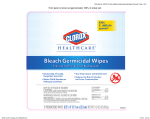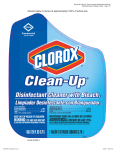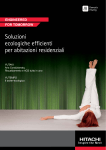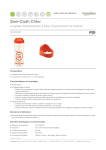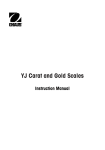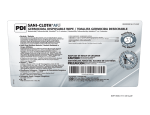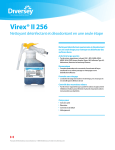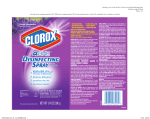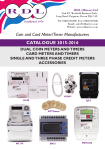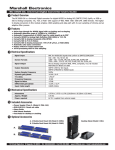Download Bleach Germicidal Wipes
Transcript
EPA Reg. No. 67619-12 Clorox Healthcare Bleach Germicidal Wipes [150 count] Page 1 of 2 Artwork shown at approximately 110%. PDF prints at approximately 100% from acrobat reader or when “Fit to printable area” settings are selected. PATHOGEN/PATÓGENO Clostridium difficile/Clostridium difficile Bacteria/Bacteria ‡Viruses/‡Virus ‡‡Bloodborne Pathogens/ ‡‡Patógenos de Transmisión Sanguínea TB/TB Parvoviruses/Parvovirus ORGANISMS: Fungi/Fungo Kills C. difficile§ spores CONTACT TIME/TIEMPO 3 minutes/3 minutos 30 seconds/30 segu 1 minute/1 minuto 1 minute/1 minuto 3 minutes/3 minutos 3 minutes/3 minutos 3 minutes/3 minutos ORGANISMS: Bleach Germicidal Wipes Toallitas Germicidas con Blanqueador KEEP OUT OF REACH OF CHILDREN. CAUTION: LIQUID CAUSES MODERATE EYE IRRITATION. SEE BACK LABEL FOR ADDITIONAL PRECAUTIONARY STATEMENTS. MANTÉNGASE FUERA DEL ALCANCE DE LOS NIÑOS. EL LÍQUIDO CAUSA UNA IRRITACIÓN MODERADA A LOS OJOS. PRECAUCIÓN: VEA LA ETIQUETA POSTERIOR PARA DECLARACIONES PREVENTIVAS ADICIONALES. Si usted no entiende la etiqueta, busque a alguien para que se la explique a usted en detalle. 67619-12_AFH_LBLwipes_150ct_R0924030.indd 1 ACTIVE INGREDIENT: Sodium Hypochlorite.................0.55% OTHER INGREDIENTS:...........99.45% TOTAL:...............................100.00% INGREDIENTE ACTIVO: Hipoclorito de Sodio..................0,55% OTROS INGREDIENTES:.........99,45% TOTAL:...............................100,00% W BY I PE 150 PREMOISTENED WIPES 6" x 5" (15.2 cm x 12.7 cm) NET WT 1 LB 11 OZ (765 g) R0924030 • One-Step Cleaner and Disinfectant • Reduces the Risk of Infection and Cross-Contamination NO T A • Bactericidal, Virucidal‡, Fungicidal, Tuberculocidal, Sporicidal • Meets OSHA Bloodborne Pathogen Guidelines BA MEDICAL EQUIPMENT SURFACES Bacteria: • Acinetobacter baumannii* • Bordetella pertussis* • Campylobacter jejuni* • Carbapenem resistant Klebsiella pneumoniae (CRKP)* • Clostridium difficile spores***§ • Community Acquired Methicillin resistant Staphylococcus aureus (NARSA NRS123)* • Community Acquired Methicillin resistant Staphylococcus aureus (NARSA NRS384)* • Enterobacter aerogenes* • Enterobacter cloacae* • Vancomycin resistant Enterococcus faecalis (VRE)* • ESBL (Extended Spectrum Beta Lactamase) producing Klebsiella pneumoniae (ESBL producing K. pneumoniae)* • ESBL (Extended Spectrum Beta Lactamase) producing Escherichia coli (ESBL producing E. coli)* • Escherichia coli* • Escherichia coli New Delhi Metallo-Beta Lactamase-1 (NDM-1 E. coli)* • Escherichia coli O157:H7* • Klebsiella pneumoniae* • Klebsiella pneumoniae New Delhi Metallo-Beta Lactamase-1 • ‡Human He (NDM-1 K. pneumoniae)* • ‡Influenza A • Legionella pneumophila* • ‡Norovirus* • Linezolid resistant • ‡Poliovirus t Staphylococcus aureus (LRSA)* • ‡Respiratory • Listeria monocytogenes* • ‡Rhinovirus • Methicillin resistant • ‡Rotavirus* Staphylococcus aureus* Bloodborne Pa • Multi-drug resistant Enterococcus • ‡‡HIV type 1 faecium (MDR E. faecium)* • ‡‡Human H • Proteus mirabilis* • ‡‡Human H Parvoviruses: • Pseudomonas aeruginosa* • Salmonella enterica* • Canine parvo • Serratia marcescens* • Feline parvo Fungi: • Shigella dysenteriae* • Staphylococcus aureus* • Trichophyton • Streptococcus pneumoniae* • Candida albi • Streptococcus pyogenes* • Vancomycin intermediate resistant * 30-sec Staphylococcus aureus (VISA)* ** 1-minu • Vancomycin resistant *** 3-minu †† Staphylococcus aureus (VRSA)* Kills Av Mycobacterium: virus o • Mycobacterium bovis (BCG) (TB)*** nonpor Viruses: § Follow • ‡Adenovirus type 2** instruc • ‡Avian Influenza A**, †† prior to • ‡Herpes simplex virus type 2** ‡ • HIV type 1* • ‡Human Coronavirus** • ‡Human Hepatitis A** • ‡Human Hepatitis B** 8/28/12 8:51 AM EPA Reg. No. 67619-12 Clorox Healthcare Bleach Germicidal Wipes [150 count] Page 2 of 2 Artwork shown at approximately 110%. PDF prints at approximately 100% from acrobat reader or when “Fit to printable area” settings are selected. PATHOGEN/PATÓGENO Clostridium difficile/Clostridium difficile Bacteria/Bacteria ‡Viruses/‡Virus ‡‡Bloodborne Pathogens/ ‡‡Patógenos de Transmisión Sanguínea TB/TB Parvoviruses/Parvovirus ORGANISMS: Fungi/Fungo CONTACT TIME/TIEMPO DE CONTACTO 3 minutes/3 minutos 30 seconds/30 segundos 1 minute/1 minuto 1 minute/1 minuto 3 minutes/3 minutos 3 minutes/3 minutos 3 minutes/3 minutos ORGANISMS: Bacteria: • Acinetobacter baumannii* • Bordetella pertussis* • Campylobacter jejuni* • Carbapenem resistant Klebsiella pneumoniae (CRKP)* • Clostridium difficile spores***§ • Community Acquired Methicillin resistant Staphylococcus aureus (NARSA NRS123)* • Community Acquired Methicillin resistant Staphylococcus aureus (NARSA NRS384)* • Enterobacter aerogenes* • Enterobacter cloacae* • Vancomycin resistant Enterococcus faecalis (VRE)* • ESBL (Extended Spectrum Beta Lactamase) producing Klebsiella pneumoniae (ESBL producing K. pneumoniae)* • ESBL (Extended Spectrum Beta Lactamase) producing Escherichia coli (ESBL producing E. coli)* • Escherichia coli* • Escherichia coli New Delhi Metallo-Beta Lactamase-1 (NDM-1 E. coli)* • Escherichia coli O157:H7* • Klebsiella pneumoniae* • Klebsiella pneumoniae New Delhi Metallo-Beta Lactamase-1 • ‡Human Hepatitis C** (NDM-1 K. pneumoniae)* • ‡Influenza A** • Legionella pneumophila* • ‡Norovirus** • Linezolid resistant • ‡Poliovirus type 1** Staphylococcus aureus (LRSA)* • ‡Respiratory syncytial virus** • Listeria monocytogenes* • ‡Rhinovirus type 37** • Methicillin resistant • ‡Rotavirus** Staphylococcus aureus* Bloodborne Pathogens: • Multi-drug resistant Enterococcus • ‡‡HIV type 1* faecium (MDR E. faecium)* • ‡‡Human Hepatitis B** • Proteus mirabilis* • ‡‡Human Hepatitis C** Parvoviruses: • Pseudomonas aeruginosa* • Salmonella enterica* • Canine parvovirus*** • Serratia marcescens* • Feline parvovirus*** Fungi: • Shigella dysenteriae* • Staphylococcus aureus* • Trichophyton mentagrophytes*** • Streptococcus pneumoniae* • Candida albicans*** • Streptococcus pyogenes* • Vancomycin intermediate resistant * 30-second contact time Staphylococcus aureus (VISA)* ** 1-minute contact time • Vancomycin resistant *** 3-minute contact time †† Staphylococcus aureus (VRSA)* Kills Avian Influenza A Mycobacterium: virus on precleaned hard, • Mycobacterium bovis (BCG) (TB)*** nonporous surfaces. Viruses: § Follow special • ‡Adenovirus type 2** instructions for cleaning • ‡Avian Influenza A**, †† prior to disinfection. • ‡Herpes simplex virus type 2** ‡ • HIV type 1* • ‡Human Coronavirus** • ‡Human Hepatitis A** • ‡Human Hepatitis B** 67619-12_AFH_LBLwipes_150ct_R0924030.indd 2 Use Sites: • Ambulances • BP monitors • Carts • Critical care units • Dialysis clinics • Emergency rooms • Examination rooms • Glucometers • Headboards • Hospitals • Intensive care units • IV stands • Nurse-call device • Nurses’ stations • Nursing homes • ORs • Patient restrooms • Patient rooms • Radiology rooms • Recovery rooms • Glazed porcelain Medical Surfaces: • Laminated surfaces • Cabinets • Plastic • Computer keyboards • Porcelain enamel • Doorknobs • Stainless steel • External ultrasound • Synthetic marble transducers • Vinyl • Gurneys Avoid Contact with: • Hard, nonporous • Brass medical surfaces • Chipped enamel • High touch surfaces • Clear plastic • IV poles • Clothes • Stretchers • Copper • Support bars • Fabric • Telephones • Natural marble • Mobile phones • Other telecommunications • Painted surfaces • Paper surfaces equipment • Rubber Surface Materials: • Sealed granite • Chrome • Silver • Enamel • Unfinished wood • Glass • Wood • Glazed ceramic DIRECTIONS FOR USE: It is a violation of Federal law to use this product in a manner inconsistent with its labeling. Not for cleaning or sanitizing skin. Do not use as a diaper wipe or for personal cleansing. For surfaces that may come in contact with food, a potable water rinse is required. Avoid contact with clothes, fabric, wood, natural rubber, and painted and paper surfaces. Do not use on silver or chipped enamel. APPLY CAREFULLY — This product contains bleach. Do not use on glassware, utensils or dishes. Always refer to manufacturer’s care instructions before using on equipment or devices. MODO DE EMPLEO: El uso de este producto de una manera diferente a la especificada en la etiqueta constituye una violación a la ley federal. No es para limpiar ni sanear la piel. No use como toallita para limpiar a un bebé ni para limpieza personal. Para superficies que puedan entrar en contacto con los alimentos se requiere un enjuague con agua potable. No lo use en cristalería, utensilios ni platos. Antes de usarlo en aparatos o equipos, consulte siempre las instrucciones de cuidado del fabricante. DISPENSER DIRECTIONS: Remove lid and discard seal. Insert corner of center sheet through flap opening on lid. DO NOT push finger through opening. Replace lid and pull wipe at an angle. The next sheet pops up automatically. When finished, close lid flap to retain moisture. DISINFECTION / PARA DESINFECTAR TO CLEAN AND DISINFECT AND DEODORIZE HARD, NONPOROUS SURFACES: Wipe hard, nonporous surface to be disinfected. Use enough wipes for treated surface to remain visibly wet for the contact time listed on label. Let air dry. Gross filth must be removed prior to disinfecting. If streaking is observed, wipe with a clean, damp cloth or paper towel after appropriate contact time has expired. Killing Clostridium difficile: Preclean hard, nonporous surfaces by removing gross filth. Wipe surface to be disinfected. Use enough wipes for treated surface to remain visibly wet for 3 minutes. Let air dry. PARA LIMPIAR, DESINFECTAR Y DESODORIZAR SUPERFICIES DURAS Y SIN POROS: Limpie la superficie dura y sin poros que se va a desinfectar. Use suficientes toallitas para que la superficie tratada permanezca visiblemente mojada durante el tiempo de contacto que se lista en la etiqueta. Deje secar al aire. El exceso de mugre se debe quitar antes de desinfectar. Si se observan rayas, limpie con un paño o con una toalla de papel limpia y húmeda después de que el tiempo de contacto adecuado se haya terminado. Para eliminar Clostridium difficile: Haga una limpieza previa de las superficies duras y sin poros quitando el exceso de mugre. Limpie la superficie que se va a desinfectar. Use suficientes toallitas para que la superficie tratada permanezca visiblemente mojada durante 3 minutos. Deje secar al aire. Special Instructions for Cleaning Prior to Disinfection against Clostridium difficile spores: Personal Protection: Wear appropriate barrier protection such as gloves, gowns, masks, and eye covering. Cleaning Procedure: Fecal matter/waste must be thoroughly cleaned from surfaces/objects before disinfection by application with this product. Cleaning is to include vigorous wiping and/or scrubbing, until all visible soil is removed. Special attention is needed for high-touch surfaces. Surfaces in patient rooms are to be cleaned in an appropriate manner, such as from right to left or left to right on horizontal surfaces, and top to bottom on vertical surfaces, to minimize spreading of the spores. Restrooms are to be cleaned last. Do not reuse soiled cloths. Infectious Materials Disposal: Materials used in the cleaning process that may contain feces/wastes are to be disposed of immediately in accordance with local regulations for infectious materials disposal. Special Instructions for Use Against HIV-1, HBV and HCV: This product kills HIV-1, HBV and HCV on precleaned environmental surfaces/objects previously soiled with blood/body fluids in health care settings or other settings in which there is an expected likelihood of soiling of inanimate surfaces/objects with blood or body fluids, and in which the surfaces/objects likely to be soiled with blood or body fluids can be associated with the potential for transmission of Human Immunodeficiency Virus (HIV-1) (associated with AIDS), Human Hepatitis B Virus (HBV) and Human Hepatitis C Virus (HCV). Special instructions for using this product to clean and decontaminate against HIV-1, HBV and HCV on surfaces/objects soiled with blood/body fluids: Personal Protection: When handling items soiled with blood or body fluids, use disposable impervious gloves, gowns, masks and eye coverings. Cleaning Procedure: Blood and other body fluids must be thoroughly cleaned from surfaces and other objects before applying this product. Contact Time: Allow surfaces to remain wet for 1 minute, let air dry. For all other organisms, see directions for contact times. Disposal of Infectious Materials: Use disposable impervious gloves, gowns, masks and eye coverings. Blood and other body fluids must be autoclaved and disposed of according to local regulations for infectious waste disposal. This product is not to be used as a terminal sterilant/high level disinfectant on any surface or instrument that (1) is introduced directly into the human body, either into or in contact with the bloodstream, or normally sterile areas of the body, or (2) contacts intact mucous membranes, but which does not ordinarily penetrate the blood barrier or otherwise enter normally sterile areas of the body. This product may be used to preclean or decontaminate critical or semi-critical medical devices prior to sterilization or high level disinfection. PRECAUTIONARY STATEMENTS: HAZARDS TO HUMANS AND DOMESTIC ANIMALS. Liquid causes moderate eye irritation. Do not get in eyes or on clothing. Avoid contact with clothing. Wear protective eyewear. Wash thoroughly with soap and water after handling and before eating, drinking, chewing gum, using tobacco or using the toilet. For sensitive skin or prolonged use, wear gloves. FIRST AID: IF IN EYES: Hold eye open and rinse slowly and gently with water for 15–20 minutes. Remove contact lenses, if present, after the first 5 minutes, then continue rinsing. Call a poison control center or doctor for treatment advice. Have the product container or label with you when calling a poison control center or doctor or going for treatment. QUESTIONS? Call (800) 234-7700. PHYSICAL AND CHEMICAL HAZARDS: This product contains bleach. Do not use this product with other chemicals, such as ammonia, toilet bowl cleaners, rust removers or acid, as this releases hazardous gases. DECLARACIONES PREVENTIVAS: RIESGOS PARA LOS SERES HUMANOS Y ANIMALES DOMÉSTICOS. CAUTION: PRECAUCIÓN: El líquido causa una irritación moderada a los ojos. No lo deje caer en los ojos ni en la ropa. Evite el contacto con la ropa. Use protección ocular. Lávese bien con agua y jabón después de usar y antes de comer, beber, mascar goma, usar tabaco o usar el inodoro. Para piel sensible o uso prolongado, use guantes. PRIMEROS AUXILIOS: CONTACTO CON LOS OJOS: Mantenga los ojos abiertos y enjuague con agua lentamente, con cuidado, durante 15–20 minutos. Si hay lentes de contacto, retírelos después de los primeros 5 minutos, luego continúe enjuagando. Llame a un médico o a un centro de control de envenenamiento para obtener asesoría sobre el tratamiento. Cuando llame a un centro de control de envenenamiento o a un médico o intente obtener tratamiento, tenga a la mano el envase o la etiqueta del producto. ¿PREGUNTAS? Llame al (800) 234-7700. RIESGOS FÍSICOS Y QUÍMICOS: Este producto contiene blanqueador. No lo utilice con otros productos químicos como amoníaco, productos para limpiar el inodoro, removedores de óxido, o ácido, ya que esto emite gases dañinos. STORAGE AND DISPOSAL: Store this product in a cool dry area, to avoid deterioration. Dispose of wipe in trash after use. Do not flush. Nonrefillable container. Do not reuse or refill empty container. Recycle empty container or discard in trash. CONTAINS NO PHOSPHORUS. QUESTIONS OR COMMENTS? Call (800) 234-7700. For MSDS information, please go to www.cloroxhealthcare.com. A list of this product’s ingredients is available at www.IngredientsInside.com. Una lista de los ingredientes de este producto se encuentra disponible en www.IngredientsInside.com. Mfd. for Clorox Professional Products Company, 1221 Broadway, Oakland, CA 94612. © 2012 Made in the U.S.A. Clorox Healthcare is a trademark of Clorox Professional Products Company. U.S. Patents 7,008,600 and 7,070,737. EPA Reg. No. 67619-12. EPA Est. No. 8251-OH-1 (Q6). NI-18491 0 Beginning of batch code indicates Est. No. R0924030 00000 00000 0 8/28/12 8:51 AM



